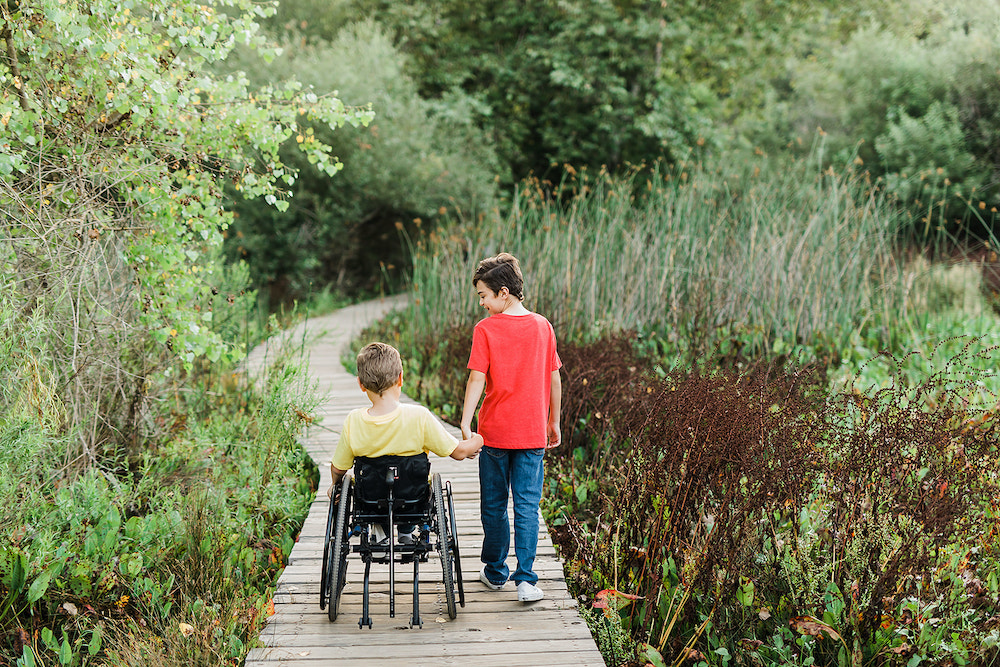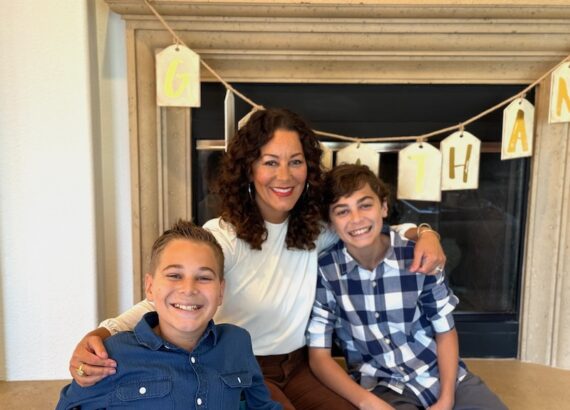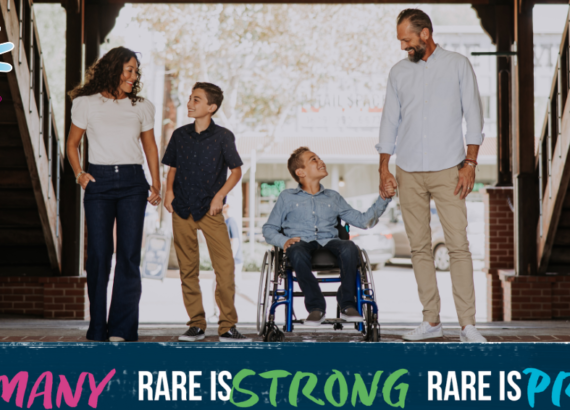Ten Takeaways for Raising Rare Siblings

In honor of National Siblings Day on April 10th, I wanted to take some time to write about a topic that so many of us moms think about and often even worry about: the siblings of our children with rare diseases. Mama, you are not alone in your concerns and worries. In talking with so many rare moms, this is one of the topics of concern most often mentioned.
In our family, my son Mason is that sibling. He is about two years older than my son Miles, who has the rare disease SMA. Mason was only three and a half when Miles was diagnosed with SMA. I remember worrying not only about Miles and how the diagnosis would affect him but also how it would affect Mason. It was always on my mind. It still is.
Over the years, I’ve spent time learning more about siblings of children with a chronic illness, rare disease, or disability. I’ve read articles, and I’ve attended seminars and webinars. I’ve been learning and gathering as much information as I can on this topic. Because this is a topic that so many of us rare moms navigate and have concerns around, I’d like to pass along what I’ve learned.
What I’ve found after reading various articles and reports and attending various seminars and webinars on the topic is that most of the recommendations and tips offered by professionals are consistent. Since there are people far more qualified than me to give you advice in this area, what I’d like to do is offer you a roundup of the research, advice, and tips I’ve gathered from child life professionals, child psychologists, and experts. I know you are time-starved, so I’ve taken some of the legwork out of this, culminated this information into the top-recommended tips, and provided links to helpful resources. Here are ten key takeaways that were included in most of the sessions I’ve attended and articles I’ve read on the subject of siblings:
1. Communicate Openly and Honestly
Siblings, like us, want information about their brother or sister’s health and condition. They want to know what’s going on. Knowing eases their anxiety about the situation. Sometimes, if we don’t give them factual information, their imagination can run wild and make things worse off than they are. It’s our job to provide them with age-appropriate facts. Be proactive: seek out trusted sources of information, and give the siblings the knowledge they need. Allow them to ask questions. Allow them to express their feelings about it. Acknowledge their concerns when they share them with you and offer reassurance when possible. Leave room for continual communication as the situation changes and as they grow and mature and can understand and process more.
2. Tailor Your Approach to the Individual
All kids are different. Like all parenting, you will have to tailor the information and the way you approach discussions on this topic to your unique child. There is not a one-size-fits-all. You are your child’s parent, and since you know them best, use that information to determine how and when you will deliver information about their sibling to them. Tailor the messaging and how you approach the subject based on their individual emotional needs. Do what you feel will serve them best.
3. Provide Support
Whether it’s speaking to a counselor or joining a sibling group, provide emotional and mental supports for the sibling to work through their feelings. Whether it’s online or in-person, a good support group will help assure siblings that they’re not alone in their feelings, experiences, and concerns. Make it a priority to give siblings ample supports.
4. Model Behavior
Siblings will take cues from us as parents on how we handle their brother or sister’s diagnosis. If we approach it with resilience and positivity, so will they. If we approach it with doom and despair, so will they. Model the behavior you want to see. Show them.
5. Spend Time with Each Child
Because so much time and attention will be devoted to your child with a rare disease, dedicate some one-on-one time with your other children. This will allow them to have their special time with you where they don’t need to share your attention. This will also let you do activities or outings that you may not normally do because of the capabilities of your child with a rare disease. Use this as your time to bond and nurture the relationship.
6. Try to Treat Children the Same
Set equal expectations of all siblings as best you can concerning behaviors and values, and celebrate all your children’s accomplishments equally. Stay consistent, so all siblings feel equal. Having similar expectations for children with and without disabilities will not only foster independence for all kids, but it can also lessen the resentment siblings may feel when there are “two different sets of rules” in place for them and their brothers or sisters.
7. Moderate Responsibilities
Let the sibling be a child, don’t put too much caretaking on their plates. Many siblings are told early on that they will be expected to care for their siblings when their parents are no longer able to do so. This puts enormous pressure on them. As a parent, make sure you are not asking too much of your child. Make certain responsibilities a choice. Encourage your kid to be a kid as long as possible. Also, be sure that you don’t expect too much when it comes to chores, schoolwork, or extracurricular activities. Typically developing children sometimes feel extra pressure to be perfect so that their parents don’t have to worry about them.
8. Elevate The Positive
Researchers have found that siblings of kids with special needs often develop flexibility, adaptability, empathy, tolerance, and resilience due to the family dynamic. Focus on these positives. Use your circumstances as an opportunity for your children and your family to learn. Elevate and grow from the positive aspects of this experience.
9. Cultivate Resiliency
One of the most important things all people need to approach life is resiliency. Resiliency is a life skill necessary for everyone, and of course, it’s even more critical on the rare-disease road. Resiliency is the quality that needs to be cultivated because it’s the skill that will help your family survive and thrive. The ultimate goal is to build internal strengths and coping skills in your child with a rare disease and all of your family members.
10. Create Family Life Outside of Rare Disease
Have a family life that revolves around something other than the rare disease. Whether it’s a shared activity like music or art, or an organization or faith community, have something in which the whole family can participate.
Resources & Links
Courageous Parents Network Guided Pathway: Tending the Siblings
National Organization for Rare Diseases (NORD) The Rare Sibling Experience
Global Genes Support for the Rare Disease Family Caring for Siblings of Kids with Rare Diseases
The Inclusion Lab 12 Ways to Support Siblings of Children with Disabilities
Kids Health from Nemours Caring for Siblings of Kids With Special Needs
American Academy of Pediatrics Siblings of Children with Chronic Illnesses or Disabilities







